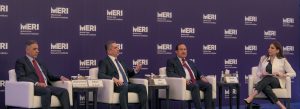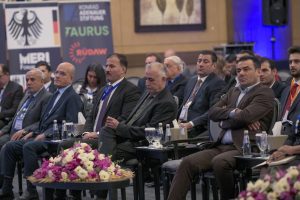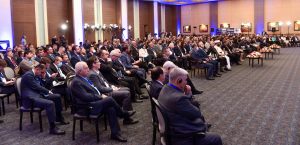State-Building in Iraq: Tackling Iraq’s fragility and regaining its sovereignty
Summary Report & Session Video
- Adnan Al-Zurfi, Leader of Iraqi Wafa Movement
- Mohammed Salim Al-Ghabban, Fatih Coalition
- Jafar Eminki, Kurdistan Democratic Party
- Zainab Rabee, Journalist and Anchor (Moderator)
This panel at MERI Forum 2022 was put together to discuss the fragility of the Iraqi state by identifying structural gaps and proposing practical policy solutions. Zainab Rabee, a media expert and session moderator, outlined the framework for discussions, by inviting each speaker to look at from their point of view(click here for video of the session in full).
Adnan Al-Zurfi, leader of the Iraqi Wafaa Movement, believed that the current political system was built on the ruins of the previous political systems, without there being a systematic transition of the governing institutions. Such a process in any country takes decades. The ruling political forces in Iraq were the former opposition forces that took power from a repressive regime. In such circumstances, there is no doubt that the opposition forces often resemble the ruling regime, considering that the Iraqi political forces practiced armed struggle in different stages of their fight against the authority, and dyed themselves with the same nature of violence that the authority exercised against them. Therefore, when the Baathist regime fell in Iraq, the Iraqi opposition arrived as armed actors and not a political, economic, financial or other authority that could quickly furnish the state system. Hence, Iraq fell into many problems.
Al- Zurfi maintained that one first of these problems is that the governing system was established on the basis of multiple and diverse structures, and the laws that the regime left behind were built according to a vision and philosophy that lasted for more than thirty-five years and the state was established on it. Then the new political regime faced the shock of terrorism that swept the country, so it was not able to formulate visions different from the visions of the previous regime, and different laws from the laws of the previous regime, except in its later years. For example; the Financial Management and Public Debt Law, which is one of the most important and enacted financial laws in the country, was not amended until recently in 2021. It was only after 2019, when the state began defining the paths of the various sectors. Hence, the next stage is that of building the foundations and pillars of the state.

Muhammad Salem Al-Ghabban, a leader within the Al-Fateh Alliance, referred to internal and external factors that are responsible for the inadequacies of the state and the imperfections in building the state and its ultimate fragility. One of these factors is the lack of a state-building vision from all political forces, which unfortunately took advantage of the opportunity to build power instead of building the state. There is now no real vision for state building. Also, the concessional division of authority between the political forces led to the emerging conflict being over the spoils and power rather than focusing on building the state and its institutions and the sobriety of government performance. There is no doubt that we cannot ignore the external factors and causes that also led to the weakness and fragility of this state. The method of overthrowing the regime and building the new political process, and turning a liberator turns to an occupier, is one of these factors.
Al-Ghabban believed that the United States came up with a project, under the slogan of liberating Iraq. Yes, the Iraqis were eager for the regime change, but for the United States to come and later turn into an occupier to exploit the Iraqi people, thus turned Iraq into a sponge to attract terrorists. Hence the method of establishing quotas without there being harmony has led to a division in society, which may be limited to division between the political forces. This, therefore, led to the fact that the state could not move in the direction of completion. The state first needs to move in the right direction as per its discourse, which must be the discourse of the state.
Al-Ghabban stressed that there is a need to review the 2005 Constitution, because he believes that it has defects in it. The issue of striking a good balance between the share of communities was to preserve their rights, but in terms of the political custom, this balance turned into political quotas and division of spoils, and turned into clientelism over the state. This should end. There are authorities other than the authority of the state, which is supposed to monopolize violence and that weapons are in the hands of the state only. These are obstacles to building the state. After the collapse of the previous regime, the old institutions collapsed and disintegrated, but there was no vision for building a moderate state, even among the international and regional actors who contributed to the overthrow of this regime. That is why state security institutions have not been rebuilt in a professional manner on the basis of having a military doctrine and a security doctrine to determine who is the enemy and who is the friend? The reform discourse must be based on the state, so that the citizen feels that the state is there to preserve their interests, it is there for everyone, and feel we are on the right track.
Jaafar Eminki, a leader in the Kurdistan Democratic Party, said that the main step in which the Iraqi political elites succeeded was to agree on the constitution and hold a referendum on it. In his view, the process was theoretically successful, but the elite failed in the practical implementation of the Constitution. The Iraqi political forces in the opposition were not in agreement on the visions regarding building the state again. Building a new state begins with adopting a new political system, but now there is no new political system based on sovereign institutions. The foundation of the institutions is fragile, which leads to the state being weak and fragile. The societal forces within the political process interact with each other at the expense of the democratic process. The Constitution focuses on the democratic process. The political process is supposed to support the democratic process, not be a substitute for it. That is why the state suffers from multi-joint problems, and societal power has become stronger than state institutions, including the security establishment. And the evidence is, when we were exposed to ISIS, we could not defend ourselves? We received support from more than 64 countries to liberate our regions. We did not succeed, either in construction or reconstruction. Building the state is a clear technical and methodological issue.

As for nation-building, we in Iraq do not have a national or ethnic problem. One of us is proud of his Kurdish nationality, another is proud of Anbar, and another is proud of Basra. Rather, the problem is with the political system, and agreements are supposed to be established within this political system and within state institutions. We have built an electoral system, but in every electoral round we think about amending this system according to the interests of the political forces. And the system is getting worse every time. Why don’t we agree on a fixed electoral system, without change. Our current dealings with the constitution are selective to a temperamental degree. There are fifty-five articles in the constitution that require systemic legislation in order for the system to be integrated. Legislative integration in Iraq does not exist. Geographical integration does not exist. Iraq is the only country that contains disputed territories without being resolved. There is no such model in the whole world. What is the fault of the citizen who lives in these areas? The Constitution resolves it through the enactment of laws, and it is in our hands and not in the hands of anyone else.
Adnan Al-Zurfi reminded the audience that the United States of America created a positive atmosphere for the political forces after 2003 to develop a new Constitution for the country. And that all political parties participated in this process. They built the Constitution and agreed on the vocabularies (such as ‘components’ and ‘federalism’) that they are now negotiating on. And then the political system began to build itself. Regional and international interests and conflicts have greatly affected the Iraqi political reality, compromised the political actors, and placed the new political system in the face of challenges beyond its ability. In other words, the US left Iraq because of an internal and regional conflict. And the great political challenges that faced the political system tried to bring down this experience. What is happening in Iraq now in terms of challenges and situations is not strange to any country in the world.
Al-Zurfi believed that Iraq is moving in an excellent political trajectory, it needs support and development of its regional and international relations, and it tries to gain more. It is possible to benefit from Iran, Saudi Arabia, and the Arab and Islamic worlds, and from the countries that supported it, such as the European Union members and the USA. In this way we can build a state. In today’s Iraq, there is sovereignty, order and security, airports, universities and schools throughout the country. The private sector is starting to grow, industries are starting to grow. The Iraqi political system has a big problem, namely, it has not relied on foreign experts in managing the financial, economic and banking systems in particular. It relied on local employees who are mainly from the school of the previous regime, the socialist school that is based primarily on preserving state funds and not operating state funds that can bring them wealth. So, the political system stopped developing rapidly.
Muhammad Al-Ghabban commented on Adnan Al-Zarfi’s optimistic words, saying that he sees the glass that is full, but we should be working on the empty half. Al-Ghabban said that the United States did not come for the sake of Iraqis. It came with a project, the ‘Greater Middle East’ project, which they initiated in Iraq, and as Condoleezza Rice expressed it, and Iraq was meant to be a tunnel for the rest of the project. This project has failed in Iraq because of the rejection of the Iraqi people and the Marjaiya that blocked it. Iraq had a different path, it had terrorism, sectarianism, and more divisions, and the establishment of quotas. For example:
- The Governing Council was tailored on the components. There were concerns, and everyone wanted representation in it and participation in policy-making and decision-making. There is no doubt that this is a natural matter, but that it turned into a custom of quotas and clientelism. This is what harmed Iraq. There is a defect in this political system and problems in the political tradition that occurred in the practices of the political forces. It must be resolved and we must put a hand on the wound and not leave these matters.
- The success of the political system is measured by the public. The real and correct criterion is that only 20% of the voters participated in the elections. What success and support for this political system are we talking about? At a time when there is money or a reconstruction movement and activity in some sectors, we still have great unemployment and great suffering, otherwise why did the October protests happen?
- We cannot say that Iraq has lost sovereignty. Yes, there are violations, escalating at times and declining at the other times, according to the data, or the regional or international situation. All of this is reflected in the Iraqi reality.
- There must be a unity of opinion, and this has to be carried out by the diverse political forces, because the Iraqi system is a pluralistic parliamentary one, based on the participation of the political actors. If this agreement does not happen, Iraq will witness permanent violations of sovereignty.

Jaafar Eminki also expressed his optimism and emphasized the necessity of identifying the root causes of the political imbalance. He described a number of phenomena:
- Two thousand Iraqi young men and women were killed in 2019 and 2020 because they staged demonstrations to demand change. If we open the wounds of the Yazidis and Christians, they are very deep. They have lost all their lives, all their territories, and their young women. There are still three thousand young women in the hands of the terrorist ISIS, and we do not know what their fate is. How can we change this reality and make the citizen trust the political system?
- The Kurdistan region, which is part of Iraq, was struck by our neighboring country, Iran, and the Iranians admitted that, and no one questioned them. Turkey is playing as it pleases within our borders, it has crossed the borders by more than twenty kilometers. So which sovereignty is this we are talking about? We need a strong country.
- As for Iraq, it is very weak. Baghdad needs Erbil, and Erbil needs Baghdad even more. They are complementary to each other. But in fact, the Iraqi federal system is a hybrid, and no one knows what it is.
- The term ‘federalism’ and ‘the components’ in the Constitution, but the project was not completed. If the federal system is not desirable, another system must be sought, and there are many other models.
Adnan Al-Zarfi reaffirmed that the concept of sovereignty today, in light of social networks, modern technologies and information technology, has no real value. Today, the concepts that we politicians discuss have become widely available. The entire world has become one network where any country can easily penetrate another country. From Iran, from Syria or Turkey.
- The Iraqi government, Iraqi state and the political system need to be prudent in the process of managing foreign relations, and to understand the regional and international interests accurately. Prudent management based on research institutes and based on the precise and strategic interests of Iraq is what determines how the state will march forward, or determine the state’s directions for the next stage.
- Iraq is officially required to open serious dialogues with Iran and Turkey with regard to security and water issues, and Iraq has taken steps even at the Security Council against Iran with regard to water. Water is a problem that threatens Iraq’s national security. Now security, including food and environmental security, in southern Iraq is threatened by water. The government should develop policies for this.

